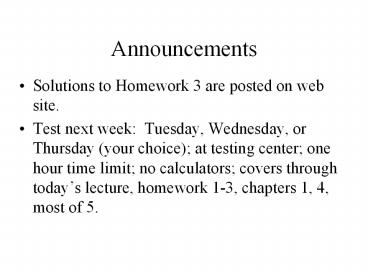Announcements - PowerPoint PPT Presentation
Title:
Announcements
Description:
... using the newly invented telescope, discovered startling facts about the sun, ... The Orbit of Mars. The Orbit is an Ellipse! Focus. Focus ... – PowerPoint PPT presentation
Number of Views:57
Avg rating:3.0/5.0
Title: Announcements
1
Announcements
- Solutions to Homework 3 are posted on web site.
- Test next week Tuesday, Wednesday, or Thursday
(your choice) at testing center one hour time
limit no calculators covers through todays
lecture, homework 1-3, chapters 1, 4, most of 5.
2
Kepler and Galileo
- 11 September 2003
3
Today
- How Johannes Kepler found a much more accurate
scheme for predicting planetary positions, based
on new mathematical laws - How Galileo, using the newly invented telescope,
discovered startling facts about the sun, moon,
stars, and planets
4
Tycho BraheDanish astronomer, 1546 - 1601
Tycho made highly accurate (within 1/60 degree)
naked-eye observations of the positions of stars
and planets over many years. He proposed a
compromise model in which all the other planets
orbit the sun, but the sun orbits the earth.
5
Johannes KeplerGerman astronomer, 1571 - 1630
Kepler worked under Tycho during 1600 - 1601,
then inherited the records of Tychos detailed
observations. He accepted the Copernican
hypothesis, but abandoned the assumption that all
motions are circular.
6
The Orbit of Marsbased on Tychos observations
Toward Mars
Earth
7
The Orbit of Mars
Earth 1.9 years later
8
The Orbit of Mars
9
The Orbit is an Ellipse!
Focus
Focus
The sun is at one focus theres nothing at the
other.
10
Planets go faster when theyre close to the sun
A line drawn from the sun to the planet sweeps
out equal areas in equal times.
11
Outer planets move slower than inner planets.
12
Outer planets move slower than inner planets.
13
Outer planets move slower than inner planets.
(Time in years)2 (Radius in AU)3
14
Keplers Laws
- Orbits are ellipses, with sun at one focus.
- Equal areas in equal times (faster when close to
sun) - (Time in years)2 (Radius in AU)3
Bottom line The universe speaks math!
15
Galileo GalileiItalian scientist, 1564 - 1642
Made one of the first telescopes, and pointed it
at the heavens . . .
16
Siderius Nuncius (The Starry Messenger)Venice,
1610
(Written in Italian, not Latin!)
17
Lunar topography . . . Sunspots . . .
18
Many new stars . . .
19
New planets orbiting Jupiter . . .
At least some planets dont orbit the earth and
earth isnt the only planet with a moon!
20
Phases of Venus . . .
Venus, at least, must orbit the sun, not the
earth.
21
What happened to Galileo?
- He became famous (not just among astronomers)
- He started advocating Copernicanism (and
ridiculing those who disagreed) - Condemned by the Church, placed under house arrest
22
A final thought . . .
Copernicus was Polish, Tycho Danish, Kepler
German, Galileo Italian, Newton English. So what?
Science belongs to everyone.































